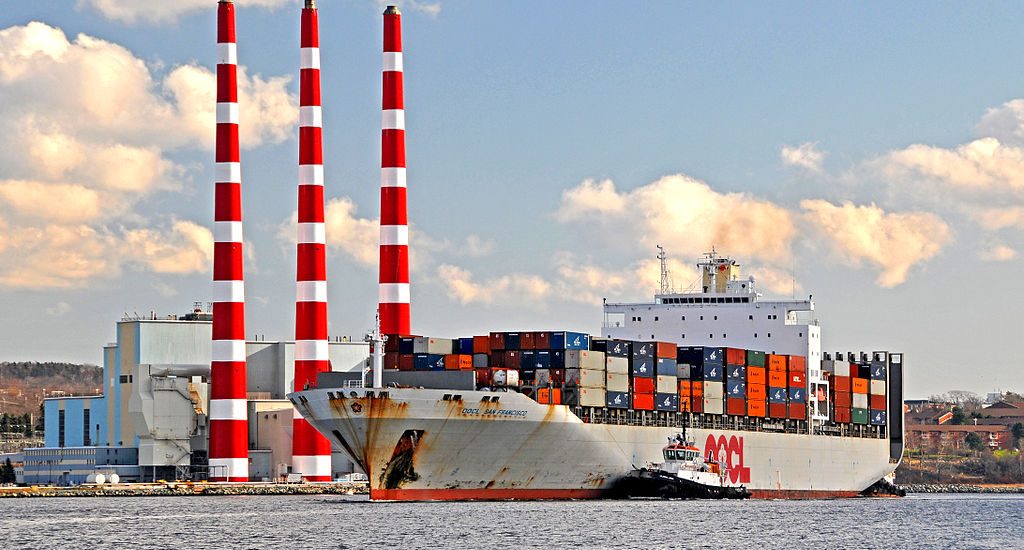
KJIPUKTUK (Halifax) – With low pay, long days, and long periods away from home working conditions for most seafarers are always difficult. But during the coronavirus pandemic, things are very bad indeed, says Karl Risser, an International Transport Workers Federation (ITF) inspector here in Nova Scotia.
The ITF is an affiliation of transport worker unions that to the best of its ability ensures that the shipping industry is regulated effectively and workers are supported, regardless of their nationality or the flag of the ship. Risser cannot just board every vessel that visits Nova Scotia ports, only those that have a unionized crew or that have an agreeable owner are fair game.
“In normal times we’re talking about guys who work for nine months straight, at very low wages. Now with COVID-19 we’ve got workers that have been on board ships for 13 or 14 months. They’re all trapped and they can’t get home to the Philippines, they can’t get home to India, to the Ukraine,” Risser says. “It’s getting desperate. We’ve heard reports of seafarers jumping overboard, seafarers fighting, massive tension on board, because no one knows for how long they will be stuck there.”
“And then there are the cruise ships that aren’t sailing. You have all nationalities on those and they have become these big quarantine hubs where they’ve been stacking and packing crew members. It makes no sense to me at all, you just need 30 guys to keep things safe, but entire crews are stuck on board because there’s nowhere for them to go. They can’t fly them home, all the infrastructure for repatriation has disappeared, you can’t get to Manila or Ghana or India. And even if you made it to India you’d find all further travel shut down.”
Risser says the Seafarers International Union and the ITF did manage to bring 74 Canadian sailors home from two cruise ships docked in the US a few weeks ago. But 74 is nothing, says Risser, who has heard of as many as 60,000 cruise ship workers trapped at sea.
Shore leave is another big issue for the cooped-up sailors docked in Halifax and elsewhere, Risser says. They’re only allowed on shore for medical reasons, and Risser and others are working with these seafarers to get prescriptions filled and so on. Risser has argued that people who have been forced into quarantine for weeks clearly are not carrying the virus, but they have to follow the Nova Scotia rules that only allow essential visitors into the province.
The shipping companies aren’t helping either.
“When I get to the captain the first thing they say is ‘no, I don’t want my crew leaving.’ And I tell them, well, your crew’s been on board for 13 months, they’d like to get away for a bit from this steel can they’re in. But as of yet we haven’t been successful getting people off,” Risser says.
When I last spoke with Risser two years ago, we talked about the extremely low wages paid to workers who are mostly from the global South and/or countries in conflict situations.
“This young man I recently met, he makes just over $400 a month, and of that he sends home $330 to support his family. That leaves him with a couple of dollars to buy smokes or whatever he needs,” Risser told me at the time. “For that he was working 290 hours per month at $1.37 per hour. 100 of those hours being overtime, he got a whopping $1.56 per hour.”
See also: The ugly underbelly of the shipping industry: hourly wages as low as $1.37
That hasn’t changed, Risser says. Some ships are still sailing, but with reduced trade many aren’t moving. Those sailors are stuck with wages between $400 and $500, and no opportunity to work overtime and maybe earn a bit more.
What allows these horrible working conditions to persist are the Flags of Convenience (FOC), the international system that allows companies to register their ships in countries with low labour and safety standards, without any genuine connection between the flag a ship flies and the nationality or residence of its owners, managers and seafarers.
The ITF is conducting a campaign to get rid of FOCs that fuel this rush to the bottom. In an increasingly fierce competitive shipping market, each new FOC is forced to promote itself by offering the lowest possible fees and the minimum of regulation. In the same way, ship owners are forced to look for the cheapest and least regulated ways of running their vessels in order to compete, and FOCs provide the solution, the ITF argues on its website.
“It’s really sad. They’re already the forgotten crews that work on these ships flying their flags of convenience, and now they’re really forgotten. For how long are these guys going to have to stay at sea? The workers want to know, how long are we going to be at sea? You can’t even get a straight answer. There’s no real willingness to act. Governments are moving slow and the lawyers are moving slow. Everybody’s saying, well, those guys are on board of their ship and they’re safe,” Risser says.
See also: Stranded sailors homeward bound after successful labour intervention
With a special thanks to our generous donors who make publication of the Nova Scotia Advocate possible.
Subscribe to the Nova Scotia Advocate weekly digest and never miss an article again. It’s free!




i really cant understand in this day and age that people are allowed to be treated like this , its pretty much slavery. why dont they have any rights and why are they not on decent living wage. THEY WORK SO HARD !! The laws need to change.They have been away from their families for over a year. Something needs change
The only way to trsolve this situation and all goverments to understand key role of seafareres is to stop the vessels and all parties concerned to understand what could happened.
Time for ITF and other maritime organizations to step in to mobilize lawyers to support seafarers and Masters to stop sailing to countries that do not allow crew changes. No crew changes, no trade.
All hub ports such as Singapore, Hongkong, Colombo, Suez, Cristobal etc and atleast selected ports in each country to be designated for crew change, procedures to test crew for Covid 19 and those who are free from covid 19 must be allowed to travel to their country if not all airports designated international airports in each country.
It is quite true that authorities are concerned about backlash from public regarding any new cases of covid 19 from new arrivals across borders. Shipowners can bear the cost of covid 19 testing which should be priced reasonably and controlled.
Surely a strategy could be worked out at IMO level and having countries sign the memorandum rather than just publishing the sad plight of seafarers.
I am sure that the percentage of seafarers suffering from covid 19 is negligible considering that they work at sea and are of low risk.
Authorities will not act unless they are put under pressure by public, what better way to deprive trade and essential commodities.
Yet again western country (Canada) is given priority (funded by ITF I presume) for sign off… Just like any other matter always the west gets to be the first…. Asians are always the least prioritised… Just like the wages… This needs to end like, now… Enough of double standards… IMO n UN move your ass!!!!!
I agree. This is inhumane. Exceptions should be made for those who test negative for Covid-19. They should not have to stay at sea for so long. And these crew members should be paid decent wages. If they don’t have to pay for food and lodging that makes a difference, but considering that, the wages should still be reasonable. These workers make other sacrifices that most people don’t, like not being able to see their families for long periods of time.